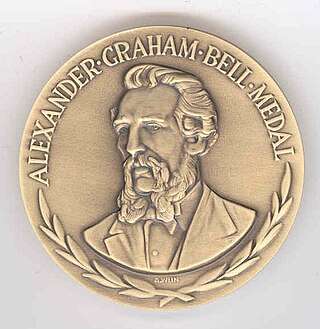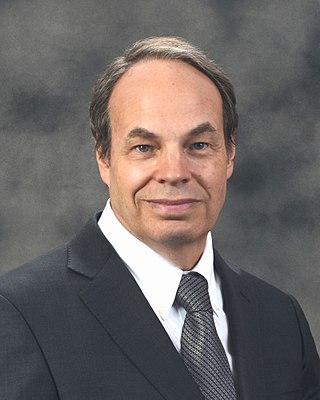
Donald Oscar Pederson was an American professor of electrical engineering at the University of California, Berkeley, and one of the designers of SPICE, a simulator for integrated circuits that has been universally used as a teaching tool and in the everyday work of circuits engineers. The IEEE Donald O. Pederson Award in Solid-State Circuits is named in his honor.
SPICE is a general-purpose, open-source analog electronic circuit simulator. It is a program used in integrated circuit and board-level design to check the integrity of circuit designs and to predict circuit behavior.

Larry Roberts was an American computer scientist and Internet pioneer.

Mark A. Horowitz is an American electrical engineer, computer scientist, inventor, and entrepreneur who is the Yahoo! Founders Professor in the School of Engineering and the Fortinet Founders Chair of the Department of Electrical Engineering at Stanford University. He holds a joint appointment in the Electrical Engineering and Computer Science departments and previously served as the Chair of the Electrical Engineering department from 2008 to 2012. He is a co-founder, the former chairman, and the former chief scientist of Rambus Inc.. Horowitz has authored over 700 published conference and research papers and is among the most highly-cited computer architects of all time. He is a prolific inventor and holds 374 patents as of 2023.
IEEE Internet Award is a Technical Field Award established by the IEEE in June 1999. The award is sponsored by Nokia Corporation. It may be presented annually to an individual or up to three recipients, for exceptional contributions to the advancement of Internet technology for network architecture, mobility and/or end-use applications. Awardees receive a bronze medal, certificate, and honorarium.

The IEEE Alexander Graham Bell Medal is an award honoring "exceptional contributions to communications and networking sciences and engineering" in the field of telecommunications. The medal is one of the highest honors awarded by the Institute of Electrical and Electronics Engineers (IEEE) for achievements in telecommunication sciences and engineering.

Asad Ali Abidi is a Pakistani-American electrical engineer. He serves as a tenured professor at University of California, Los Angeles, and is the inaugural holder of the Abdus Salam Chair at the Lahore University of Management Sciences (LUMS). He is best known for pioneering RF CMOS technology during the late 1980s to early 1990s. As of 2008, the radio transceivers in all wireless networking devices and modern mobile phones are mass-produced as RF CMOS devices.
Behzad Razavi is an Iranian-American professor and researcher of electrical and electronic engineering. Noted for his research in communications circuitry, Razavi is the director of the Communication Circuits Laboratory at the University of California Los Angeles. He is a Fellow and a distinguished lecturer for the Institute of Electrical and Electronics Engineers. Among his awards, Razavi is a two-time recipient of the Beatrice Winner Award for Editorial Excellence at the 1994 and 2001 International Solid-State Circuits Conferences. In 2017, he was elected as a member into the National Academy of Engineering for contributions to low-power broadband communication circuits.
The IEEE Jack S. Kilby Signal Processing Medal is presented "for outstanding achievements in signal processing" theory, technology or commerce. The recipients of this award will receive a gold medal, together with a replica in bronze, a certificate and an honorarium.
The IEEE Richard M. Emberson Award was established by the IEEE Board of Directors in 1986. It is presented to an IEEE member for distinguished service to the development, viability, advancement, and pursuit of the technical objectives of the IEEE.

Chenming Calvin Hu is a Taiwanese-American electronic engineer who specializes in microelectronics. He is TSMC Distinguished Professor Emeritus in the electronic engineering and computer science department of the University of California, Berkeley. In 2009, the Institute of Electrical and Electronics Engineers described him as a “microelectronics visionary … whose seminal work on metal-oxide semiconductor MOS reliability and device modeling has had enormous impact on the continued scaling of electronic devices”.
The Computer Pioneer Award was established in 1981 by the Board of Governors of the IEEE Computer Society to recognize and honor the vision of those people whose efforts resulted in the creation and continued vitality of the computer industry. The award is presented to outstanding individuals whose main contribution to the concepts and development of the computer field was made at least fifteen years earlier. The recognition is engraved on a silver medal specially struck for the Society.
Daniel "Dan" William Dobberpuhl was an electrical engineer in the United States who led several teams of microprocessor designers.
Robert W. Brodersen was a professor emeritus of electrical engineering, and a founder of the Berkeley Wireless Research Center (BWRC) at the University of California, Berkeley.
Teresa Huai-Ying Meng is a Taiwanese-American academician and entrepreneur. She is the Reid Weaver Dennis Professor of Electrical Engineering, Emerita, at Stanford University, and founder of Atheros Communications, a wireless semiconductor company acquired by Qualcomm, Inc.
Stephen "Steve" Trimberger is an American computer scientist, electrical engineer, philanthropist, and prolific inventor with 250 US utility patents as of August 26, 2021. He is a DARPA program manager of the microsystems technology office.

Robert Whitlock Adams is a Technical Fellow at Analog Devices, Inc. (ADI) in Wilmington, Massachusetts. His focus is on signal processing and analog-to-digital conversion for professional audio. He is a leader in the development of sigma-delta converters, introducing architectural advances including mismatch shaping, multi-bit quantization, and continuous-time architectures.

Anantha P. Chandrakasan is the Chief Innovation and Strategy Officer, the dean of the School of Engineering, and Vannevar Bush Professor of Electrical Engineering and Computer Science at Massachusetts Institute of Technology. He is chair of the MIT Climate and Sustainability Consortium and MIT AI Hardware Program, and co-chair the MIT–IBM Watson AI Lab, the MIT–Takeda Program, and the MIT and Accenture Convergence Initiative for Industry and Technology.
Willy Sansen was an electrical engineer, academic, and author. He is an emeritus professor of sngineering science at the Katholieke Universiteit Leuven.







